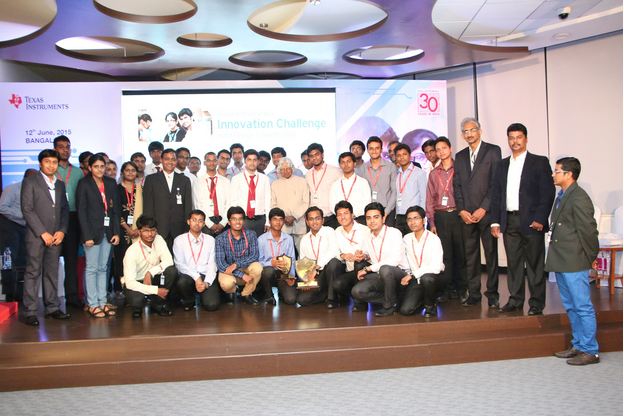The Texas Instruments Innovation Challenge (TIIC) India is a well-recognised design contest, and a great platform for engineering students to showcase their innovations. It recognises student projects that use TI’s products and solutions to solve real-world problems and create lasting social impact. Over the course of six years, more than 80,000 engineering students from across India have participated in this contest.
The sixth edition of TIIC concluded at the TI Bangalore campus on 12th June 2015, with Dr APJ Abdul Kalam as the chief guest. Let us take a look at the student projects that made it to the top ten of TIIC and how they were worth it.

Cheap, after-market pre-crash detection solution
The winning project of TIIC India Design Contest 2015 was a low-cost, frequency-modulated, continuous-wave (FMCW) radar-based system that assists low-visibility navigation in automobiles. The device works in the S-band of the microwave range, with 2.5GHz as the centre frequency. It uses digital signal processing (DSP) for detecting and determining the distance to the obstacle, and the intensity of the warning signal produced increases with the decrease in distance between the vehicle and the obstacle.
Why innovative:
- It is an after-market solution, which means one can install the system as an add-on to their existing vehicle.
- The automotive cruise control frequency is 77GHz (W-band) in usual collision avoidance systems, but that was banned in India due to the defence sector occupying that band. The use of the S-band in this project instead of the W-band makes this device permissible in our country.
- The team wanted to make the system affordable (₹5000-7000) as well as efficient. So, unlike the costly systems available nowadays, they opted for a lower-resolution processing, which still serves the purpose.
College: MS Ramaiah Institute of Technology, Bengaluru
Secure, remotely-controlled irrigation
Considering the immense time and effort required by farmers to manually turn on and off irrigation pumps, this group of students came up with a device named as Xencom to control the pump using a basic cellular phone or a landline along with advanced password protection and audio feedback on status and updates of operations. It also has a battery backup to get through power cuts and a soil moisture monitor. The major parts of this system are a Global System for Mobile (GSM) communication module, an interactive voice response (IVR) system and a magnetic reed sensor array. This project came out as the first runner-up of the contest.
Why innovative:
- Enables the user to control the pump remotely using a landline or any mobile phone.
- Includes password protection.
- Uses phone calls and SMS services to keep the user updated or give warnings (including overflow of pump, power cuts, low soil moisture etc).
- Has a timer facility to control the duration of pumping.
College: Meghnad Saha Institute of Technology, Kolkata
Monitoring plant health at a low cost
The second runner-up, named as FarmCorder, this device measures the basic parameters of the plant sand soil such as nitrogen level, fluorescence, moisture level, ambient light and temperature, using simple sensors. This data is collected and sent to the server via a GSM module. It is processed there and feedback is given to the farmer via text messages.
Why innovative:
- Low cost components are used in this system, making it affordable.
- Suggestions such as the amount of fertiliser to be used and the quantity of water to be sprayed are sent to the farmer through SMS.
College: Easwari Engineering College, Chennai









